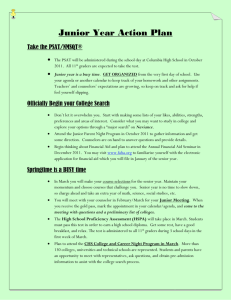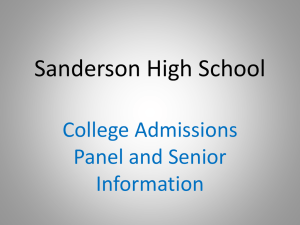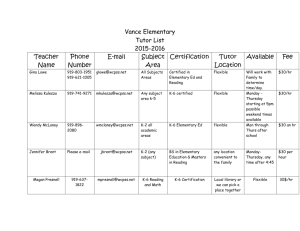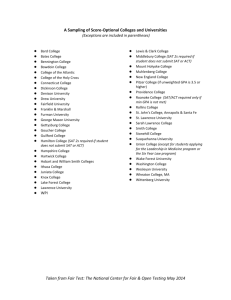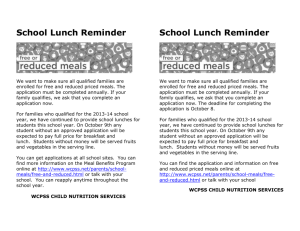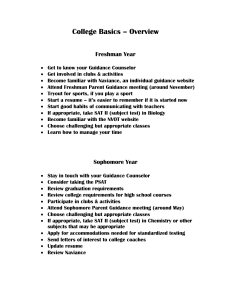College - Sophomores
advertisement
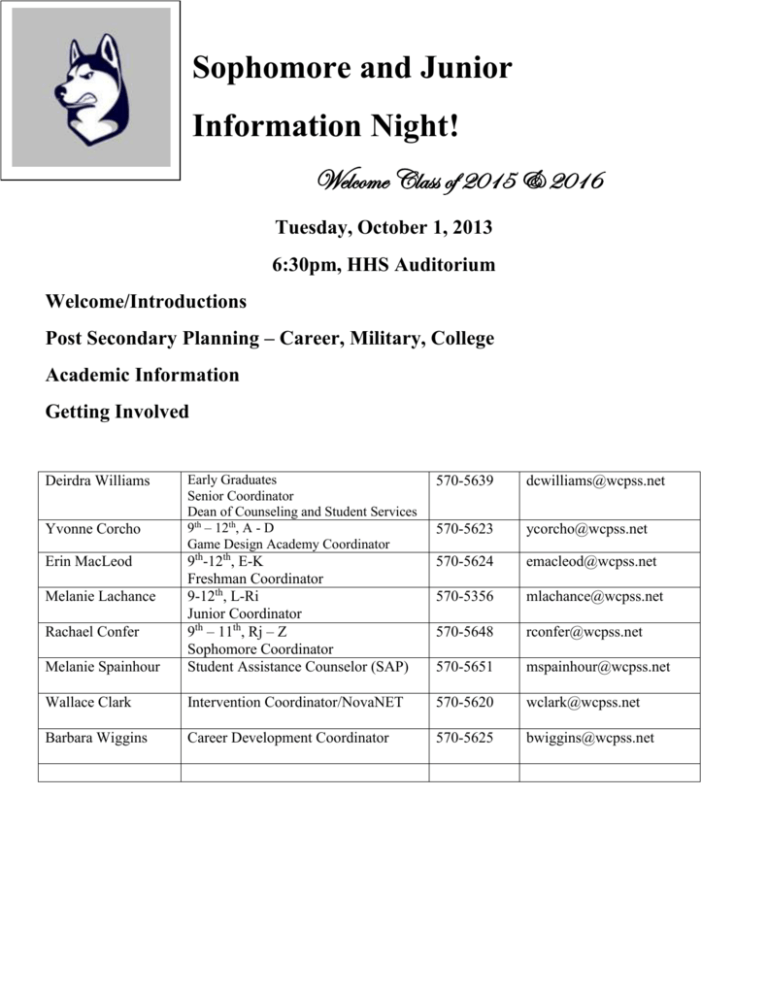
Sophomore and Junior Information Night! Welcome Class of 2015 & 2016 Tuesday, October 1, 2013 6:30pm, HHS Auditorium Welcome/Introductions Post Secondary Planning – Career, Military, College Academic Information Getting Involved Early Graduates Senior Coordinator Dean of Counseling and Student Services 9th – 12th, A - D Game Design Academy Coordinator 570-5639 dcwilliams@wcpss.net 570-5623 ycorcho@wcpss.net 570-5624 emacleod@wcpss.net 570-5356 mlachance@wcpss.net 570-5648 rconfer@wcpss.net Melanie Spainhour 9th-12th, E-K Freshman Coordinator 9-12th, L-Ri Junior Coordinator 9th – 11th, Rj – Z Sophomore Coordinator Student Assistance Counselor (SAP) 570-5651 mspainhour@wcpss.net Wallace Clark Intervention Coordinator/NovaNET 570-5620 wclark@wcpss.net Barbara Wiggins Career Development Coordinator 570-5625 bwiggins@wcpss.net Deirdra Williams Yvonne Corcho Erin MacLeod Melanie Lachance Rachael Confer Minimum Admissions Requirements for UNC System Schools: 2.5 GPA, 800 SAT (CR+M), 17 ACT NORTH CAROLINA COLLEGE/UNIVERSITY STATS (Scores based on Fall 2010) College & SAT Verbal Range SAT Math Range University Appalachian State University Barton College Belmont Abbey College Bennett College Brevard College Cabarrus College of Health Sciences Campbell University Catawba College Chowan College Davidson College Duke University East Carolina University Elizabeth City State University Elon University Fayetteville State University Gardner-Webb University Greensboro College Guilford College High Point University Johnson & Wales Lees-McRae College Livingstone College Mars Hill College Meredith College Methodist College Montreat College Mount Olive College NC A&T State University NC Central University NC School of the Arts NC State University NC Wesleyan College Peace College ACT GPA Range 3.75 or higher GPA 3.493.74 GPA 3.493.0 GPA 2.5-2.99 GPA 2.0-2.49 510-610 530-610 22-26 67% 18% 14% 1% -- 360-570 450-570 450-590 460-550 17-22 17-23 7% 12% 10% 13% 37% 22% 34% 37% 12% 15% 370-460 420-540 420-570 350-420 430-550 520-570 13-18 18-22 20-22 3% 9% 39% 23% 44% 33% 68% 47% 11% 420-540 440-580 380-470 630-720 660-750 460-550 450-560 470-520 380-480 630-710 680-780 490-570 19-24 18-25 15-21 28-32 30-34 20-24 35% 36% 69% 35% 22% 42% 12% 33% 31% 22% 1% 14% 360-470 380-470 15-18 6% 21% 66% 560-650 370-450 560-660 390-470 25-28 15-20 61% - 19% - 8% - 440-570 430-550 18-23 38% 24% 25% 390-590 460-620 490-590 400-610 480-600 490-610 15-25 20-27 21-26 22% 9% 17% 28% 42% 35% 37% 35% 30% 390-520 470-660 330-420 410-520 450-570 430-540 430-570 410-490 400-500 410-530 470-530 330-430 430-540 450-570 450-570 440-530 420-520 410-500 20-28 13-16 17-23 19-25 18-23 19-26 15-20 16-21 14% 15% 22% 17% 22% 13% 5% 32% 20% 23% 35% 33% 25% 53% 42% 46% 39% 27% 35% 44% 31% 390-490 380-460 15-18 7% 20% 60% - - - - 530-620 410-520 560-660 420-550 23-28 16-22 93% - 2% - - 410-520 400-500 16-18 23% 25% 30% College & University Pfeiffer University Queens University of Charlotte Roanoke Bible College St. Andrews Presbyterian College St. Augustine’s College Salem College Shaw University UNC at Asheville UNC at Chapel Hill UNC at Charlotte UNC at Greensboro UNC at Pembroke UNC at Wilmington Wake Forest University Warren Wilson College Western Carolina University Wingate University Winston-Salem State University - GPA 3.5-3.0 GPA 2.0-2.99 16-23 20-25 GPA 3.75 or higher 23% 25% 26% 38% 36% 30% 430-540 16-21 4% 39% 40% 330-420 330-420 15-19 3% 8% 59% 480-610 340-440 540-640 590-700 470-580 330-410 530-630 610-710 22-28 14-17 23-27 27-31 48% 1% 65% 95% 24% 5% 35% 2% 6% 71% 1% 480-570 460-560 500-590 460-560 20-25 - 41% 42% 32% 32% 6% 6% 410-490 540-620 420-500 550-620 17-20 22-26 15% 70% 29% 12% 43% 1% 600-690 620-710 28-31 - - - 540-670 500-610 22-27 - - - 470-560 480-570 17-24 33% 31% 20% 450-560 460-570 19-25 31% 24% 31% 400-480 410-490 - - - - SAT Verbal Range 490-540 460-580 SAT Math Range 440-550 470-570 ACT Range 420-540 No colleges reported students with below a 2.0 GPA Information gathered from: www.collegeboard.com 10th Grade Planning Timeline Keep those grades up! You might have a lot going on this year, but it's important to stay focused on your schoolwork. Sign up for a college savings account or continue to add money to an existing account. Talk to your parents about financial aid options. It's a good idea to start talking about how you're going to pay for college or life after high school, in general. Continue extracurricular activities. Remember, many admissions officers look for well-rounded students who participate in the world around them. If you have room in your schedule, consider a part-time job or volunteer position. Take the PLAN test in October. This is a valuable test to help you prepare for the ACT, which you can take next year. When you get your scores back in the winter, learn about them and what they tell you. Take the PSAT in October. The scores will not count for National Merit Scholar consideration this year, but it is good practice for taking the PSAT in your junior year (when the scores will count). When you get your scores back in the winter, learn about them and what they tell you. It's not too early to start studying for standardized tests like the ACT and SAT. A great place to start is with the Test Prep section on CFNC.org. Your PLAN and PSAT scores can help you tailor your studying specifically to you. Ask your counselor if you want to know about more resources to help you learn more about these tests. Look into participating in academic enrichment programs, summer workshops and camps with specialty focuses such as music, arts and sciences – some of these may have applications in the fall or winter – so plan ahead. Continue your conversations with your school counselors, teachers, family members or trusted adults about your plans for college or other paths towards a career or the military. Update your post secondary planning file — or start one, if you haven't already. If you are interested in going to college, make a list of reasons why you like different colleges and universities — programs, location, cost and so on. Visit college campuses and "tour" colleges in the Explore Schools section. Start thinking about what factors are important to you in choosing a college: size, location, availability of extracurricular activities, for example. This winter, find out about AP and other honors-level courses for junior year. This winter, investigate your options for participating in dual enrollment next year. This allows juniors and seniors to enroll in college courses if they meet certain requirements. Keep reading! Expanding your vocabulary and learning new things will help with many things over the next few years. *Adopted from CFNC.ORG. Junior Year Planning Calendar Summer Review your high school course plans and school activities. Ensure that you are on track for graduation and college entrance requirements. Think about how you will pay for college. Talk to your parents about your post-secondary goals. Schedule a meeting with your school counselor. Enroll in courses that will challenge you. Attend College and Career Fairs. Early Fall Register and pay for the PSAT. Take the PSAT to be entered into the National Merit Scholarship Qualifying Test (NMSQT) competition. Review your academic records (report cards, transcripts, GPA.) Continue to attend College and Career Fairs. Begin to prepare for admission and scholarship essays. What are your interests, educational priorities, and special talents? Check on the nomination process for military academies if you are interested. You must contact your local state-level elected officials for most military programs. Midyear PSAT results are returned. Begin to identify college features that suit your needs. These include size, location, majors, financial opportunities, and social/cultural activities. Review CFNC.org application process. Register for the SAT I, ACT, or SAT II subject tests if appropriate. Study for your finals. Start discussing course selections for your senior year with your teachers and school counselor to ensure you are on track for graduation Student athletes - research NCAA Clearinghouse requirements. Spring Develop/update your high school resume. If you are taking an AP exam, make sure you register online. Research summer enrichment opportunities and part time jobs. Prepare for final exams. Colleges will see your final grades. Finalize your course selections for senior year. See your school counselor if you need help of have any questions. Attend the NACAC College Fair Summer prior to your senior year Continue to visit college campuses. Research potential scholarships. Junior Planning Checklist STUDENTS Register and pay to take the PSAT/NMSQT (your school automatically provides this test). Check the dates and locations of local college fairs. Attend college fairs. WCPSS College Fair is 9/20/09. Take the PSAT Register for challenging course. (i.e., honors, advanced placement) Refine your lists of schools; eliminate the ones that do not meet your criteria. Request catalogs for schools remaining on your list. Visit those schools as well, many offer campus tours. Consider taking SAT prep courses to improve your scores. Register to take the SAT or ACT if appropriate to your post secondary plans. Find out which schools require the SAT II subject tests in addition to the SAT test, there are currently 15 subject tests. Consider volunteer experience in your area of interest. Finalize your list of 6-10 colleges or universities. Note all admissions deadlines. Register for a CFNC.org account to apply online if you don’t already have one. Develop a resume and keep it updated. CFNC.org can keep track of all of these things for you. Conduct scholarship research over the summer! You want to start applying for scholarships at the beginning of your senior year! ATHLETES! If you intend to participate in college athletics at a Division I or II school, start your NCAA Clearinghouse application at the END of the Junior Year. There is a staff member in your Student Services department who can assist you with this. PARENTS Help your student make realistic goals. Look at the financial costs for various colleges. Have your student start a checklist that includes deadlines and make sure they complete it. Allow your student to make their own future plans. Encourage independence, so that they will complete their own applications. Make sure they keep up their grades and turn in all assignments. Encourage them to do volunteer work and participate in extracurricular activities. Meet with your student’s counselor and attend any programs that are offered at the school. Make it possible for your student to visit many schools in his/her list. Teach your student how to advocate for themselves respectfully. Encourage your student to sign up for SAT study courses. Instill in your student the importance of deadlines. They will be crucial in their senior year. Helpful Resources Name Heritage High School New website, opens best with Firefox or Google chrome browser. Wake County Public School System Information on student assignment, academic support resources, planning guides and more North Carolina Virtual Public School Online, dual enrollment, course options (academic, honors and advanced placement available) College Foundation of North Carolina Comprehensive site for planning for and applying to college as well as financial aid ***College Matching Assistant College Week Live College search engine that hosts virtual tours CollegeBoard SAT registration, College planning You Can Go! The You Can Go program is sponsored by Collegeboard and is used to support students who don’t believe college is a possibility. ACT ACT registration, College planning NCAA Eligibility Center Information for potential college student athletes, initial eligibility website, and download the “Guide for the College-bound Student Athlete. Formerly known as the NCAA Clearinghouse. UNC System Information regarding all the public institutions in North Carolina, including enrollment, etc. NC Independent Colleges Information regarding all the private institutions in North Carolina Futures for Kids College and career planning, resume, etc. Selective Service Selective Service and Information Wake Tech Career and College Promise Provides specific career and college course options for high school students as well as career pathway planning WCPSS CTE High School A new high school opening in Wake County that will focus specifically on 10 different CTE tracks. Trade and Vocational Schools Trade school search engine Other college search/planning websites How to Find http://heritagehs.wcpss.net (click on Student Services to see links to the main SS website and grade level sites) www.wcpss.net www.ncvps.org www.cfnc.org www.collegeweeklive.com www.collegeboard.com www.ycg.org www.act.org www.ncaaeligibilitycenter.org www.northcarolina.edu www.ncicu.org www.f4k.org www.sss.gov http://www2.waketech.edu/blogs/recruiting/collegecareerpromise/ http://ctehs.wcpss.net/ http://www.youtube.com/watch?v=ypzuqwjkdJw&feature=youtu.be www.tradevocationalschools.com www.collegecareerlifeplanning.com www.educationplanning.com www.collegeispossible.org www.collegenet.com www.collegeview.com www.collegequest.com www.edupass.org www2.edtrust.org www.embark.com www.kaplan.com www.petersons.com www.review.com www.campustours.com www.collegequest.com www.schoolsintheUSA.com US Department of Education Federal resources for information and publications on career development, financial aid, etc. FAFSA Free Application for Federal Student Aid Scholarship Plus Scholarship Search Site for WCPSS Students Fast Web Free college and scholarship search and financial aid information Sallie Mae Foundation Financial aid information www.ed.gov www.fafsa.ed.gov www.scholarshipplus.com/wake www.fastweb.com www.salliemae.com Upcoming Student Services Events October 3 October 8 October 16 October 21 November 13 November 18 PLAN for all 10th Graders that have completed Algebra 1 or Common Core 1B Freshmen Night PSAT College Planning Series “What it Takes to Get In” Fall Conference Night College Planning Series “Financial Aid 101” Considerations/Notes: What information is relevant to me? I need more information for… To Do List:


